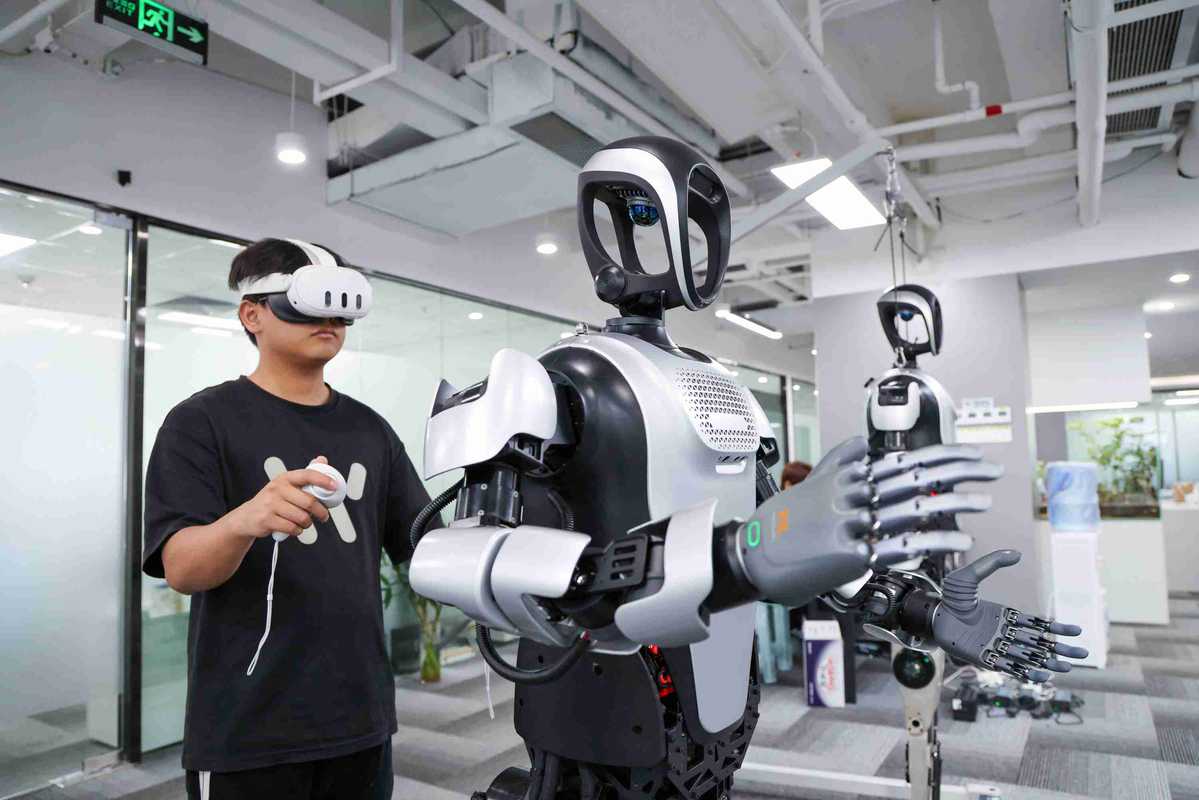
A technician debugs a humanoid robot at a technology company in Shenzhen, Guangdong province, on March 27. LIANG XU/XINHUA
Chinese enterprises gradually moving toward high-quality growth trajectory
Chinese companies should scale up investments in fast-evolving artificial intelligence technology and push forward digital transformation as part of a broader push to accelerate the shift toward an innovation-led and quality-driven growth model, and navigate an increasingly complex global landscape, industry experts said.
Coupled with geopolitical tensions and macroeconomic fluctuations, an increasing number of enterprises are reviewing their traditional growth models, and need to adopt more flexible strategies to cope with supply chain restructuring and changes in export control measures, said a report by global consultancy Accenture.
The report said in recent years that Chinese enterprises have gradually moved away from a reliance on scale-driven growth toward high-quality growth, mainly driven by increased investment in technological innovation, accelerated global expansion and continued capital input in digitalization.
Their breakthroughs in AI, robotics and biomedicine highlight China's growing innovation capability in critical technologies that underpin long-term competitiveness, it stated.
The consultancy estimates that adopting a holistic approach to productivity, with generative AI acting as a multiplier, could boost productivity growth from 1.9 percent to 15.9 percent.
Generative AI refers to computer algorithms trained with huge amounts of data capable of generating content such as images, text, audio and video in a human-like fashion. It is the key technology underpinning United States-based research company OpenAI's ChatGPT.
"Chinese companies must strengthen foundational R&D, pursue long-term innovation and embed new technologies into core business scenarios," said Samantha Zhu, chairperson of Accenture Greater China, adding that they should foster agile, cross-functional talent with upskilling and rotation mechanisms, and leverage generative AI to boost productivity.
The country's spending on research and development has maintained rapid growth thanks to efforts to support technological innovation. The National Bureau of Statistics said China's R&D expenditure exceeded 3.6 trillion yuan ($501.2 billion) in 2024, up 8.3 percent year-on-year, ranking second globally.
Moreover, a rising number of Chinese companies are pursuing international growth, expanding into new markets, building global supply chains and strengthening localizing operations, reflecting a proactive approach to navigate global complexities and diversify revenue sources, the report stated.
Zhu said that in the process of globalization, these companies must strengthen localized operation capabilities and build global brands, highlighting that digital technologies represented by generative AI can not only help enterprises enhance response capabilities in overseas markets, but also deepen customer insights and elevate operational efficiency on the global stage.
The nation's AI sector will make great strides in the next 10 to 15 years, with its market size reaching 1.73 trillion yuan by 2035, accounting for 30.6 percent of the global total, said market research firm CCID Consulting.
Xiang Ligang, director-general of the Zhongguancun Modern Information Consumer Application Industry Technology Alliance — a telecom industry association — underscored the significance of developing digital technologies such as AI, which will inject fresh impetus into the country's economic growth and promote the digital transformation and upgrades of traditional industries.
Noting that some Chinese enterprises are facing mounting difficulties in digital transformation, including budgetary shortfalls and inadequate skills training, Xiang said these companies should devise long-term plans and continuously pour money into this field.
Chinese companies are becoming more active in investing in advanced digital technologies and bolstering technological innovation, while generative AI is increasingly perceived as a key driver to build resilient supply chains and help companies adapt more quickly to sudden changes and take data-driven and real-time actions, said Pan Helin, a member of the Expert Committee for Information and Communication Economy, which is part of the Ministry of Industry and Information Technology.
















